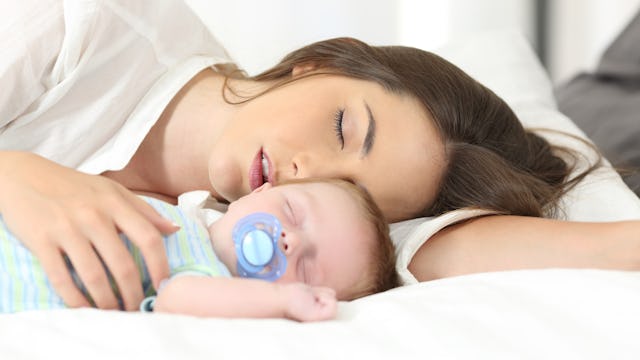Co-Sleeping Past 6 Months Makes Moms Feel More Depressed -- And Judged

There’s evidence that moms who co-sleep past six months are more likely to feel depressed
A new study about moms co-sleeping with their babies provides some interesting information about what that arrangement means for a mother’s mental health.
And it’s not exactly encouraging.
The Penn State study looked at 103 new mothers and found a pattern with those who co-slept longer than six months: those moms reported feeling more depressed and judged. For this study, co-sleeping is defined as either sharing a bed or room with baby, so these results include families that do both. The study found that moms who co-slept beyond six months were 76 percent more depressed than those who moved baby to their own room. Co-sleeping moms also felt 16 percent more judged than for their choice to room in or share a bed with their little one.
The results also showed that the rate of moms co-sleeping dropped as the babies got older. 73 percent co-slept at the one-month mark while only 50 percent did so at three months. By six months, the rate dropped to 25 percent.
“We definitely saw that the persistent cosleepers — the moms that were still cosleeping after six months — were the ones who seemed to get the most criticism,” says Douglas Teti, a department head and professor at Penn State. “Additionally, they also reported greater levels of worry about their baby’s sleep, which makes sense when you’re getting criticized about something that people are saying you shouldn’t be doing; that raises self-doubt. That’s not good for anyone.”
In other words, all that judging isn’t particularly healthy for the mental state of a new mom. Shocking, right?
But as far as deciding what sleep situation works best for your family, it’s not the opinions of strangers and your playgroup friends that should count — it’s all up to you and your partner.
Teti says, “If you’re going to co-sleep, you have to make sure both people in the partnership have talked it through and both people are in sync with what they want to do. If not, that’s when criticism and arguments can happen, and possibly spill over into the relationship with child. So you want to avoid that. You need to make sure you have time with your partner, as well.”
Anecdotally, I can safely say that co-sleeping past six months didn’t exactly contribute to my health and well-being because it wasn’t a choice I purposely made. I co-slept with my son because otherwise, he wouldn’t sleep. And I was so nervous of rolling on him that I only slept lightly. So by that point, I was pretty defensive about my child’s sleep habits and feeling judged whether anyone had negative feedback or not. I’d guess that I’m not alone there when it comes to co-sleeping with an older baby, hence, the study’s results.
Also, Teti lays down some pretty hard truth about who will be bothered most by a possibly disruptive co-sleeping situation. Spoiler alert: it’s not dads.
“If you cosleep, it’s going to disrupt your sleep, and probably Mom’s sleep more than Dad’s. So this is something to be careful with if you’re not good with chronic sleep debt. Cosleeping needs to work well for everyone, and that includes getting adequate sleep. To be the best parent you can be, you have to take care of yourself, and your child benefits as a result.”
Amen to that.